The post Bringing A-Beauty Home from Australia appeared first on The Blonde Abroad.
from The Blonde Abroad https://ift.tt/2uCCWNK
The post Bringing A-Beauty Home from Australia appeared first on The Blonde Abroad.
The post Best Wine Regions in the World appeared first on The Blonde Abroad.
The post Tips for Traveling Paris on a Budget appeared first on The Blonde Abroad.
The post 10 Tips for your First Trip to France appeared first on The Blonde Abroad.
The post 10 Tips for Your First Trip to Hong Kong appeared first on The Blonde Abroad.
The post Top Things to Do in Paris appeared first on The Blonde Abroad.
The post Tips for Traveling Iceland on a Budget appeared first on The Blonde Abroad.
The post 10 Tips for Your First Trip to Bali appeared first on The Blonde Abroad.
The post App in the Air: The Best App for Frequent Flyers appeared first on The Blonde Abroad.
The post Tips for Visiting Roussillon appeared first on The Blonde Abroad.
The post How to Travel Cape Town on a Budget appeared first on The Blonde Abroad.
The post The Best Time to Travel to France appeared first on The Blonde Abroad.
The post 10 Tips for Your First Trip to Iceland appeared first on The Blonde Abroad.
The post The Best Time to Travel to Namibia appeared first on The Blonde Abroad.
The post 10 Tips for Your First Trip to Thailand appeared first on The Blonde Abroad.
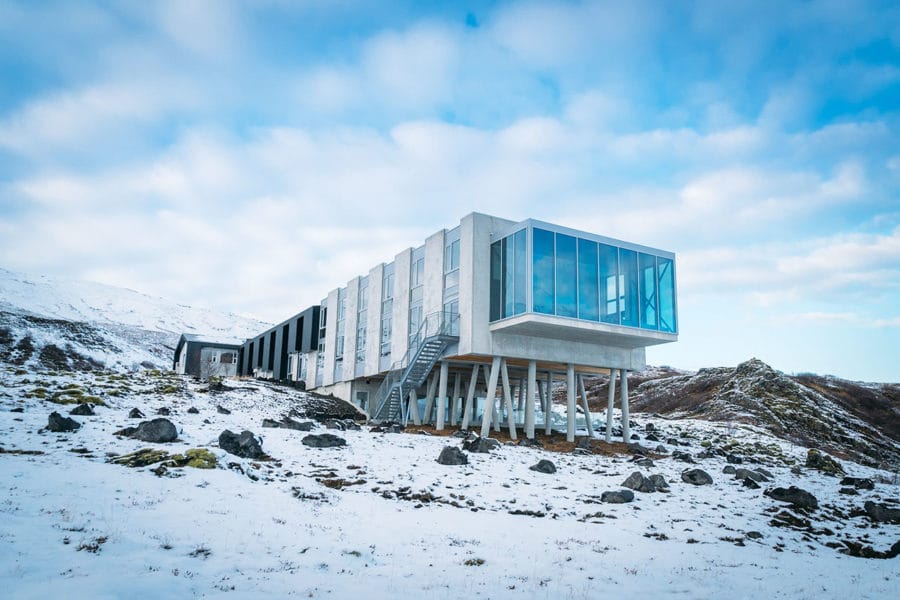
The Best Places to Stay in Iceland
Iceland has become an incredibly popular travel destination over the last few years. Learn where to stay in Iceland for your vacation including the best hotels, budget hostels, and campgrounds.
As I’m sure you’re already aware by now, Iceland is an incredible holiday destination for all types of people, from families to adventurous solo travelers.
While flights have become increasingly cheap, food & lodging however are not.
There are tons of unique places to stay in Iceland due to its diverse scenery, and every time I visit I find something new to experience, which makes it one of my favorite countries.
When it comes to finding a place to stay in Iceland, hotels can be on the expensive side, and there aren’t a lot of options compared to other countries. Hotels can get booked up months in advance, especially during the high season.
It’s important to book your accommodation in Iceland early to get the best deals.
In this guide, I’ll cover everything from budget backpacker hostels to luxury Reykjavik hotels, family-owned farms, campgrounds, and even campervan rentals — you’ll learn exactly where to stay in Iceland to have a great time.
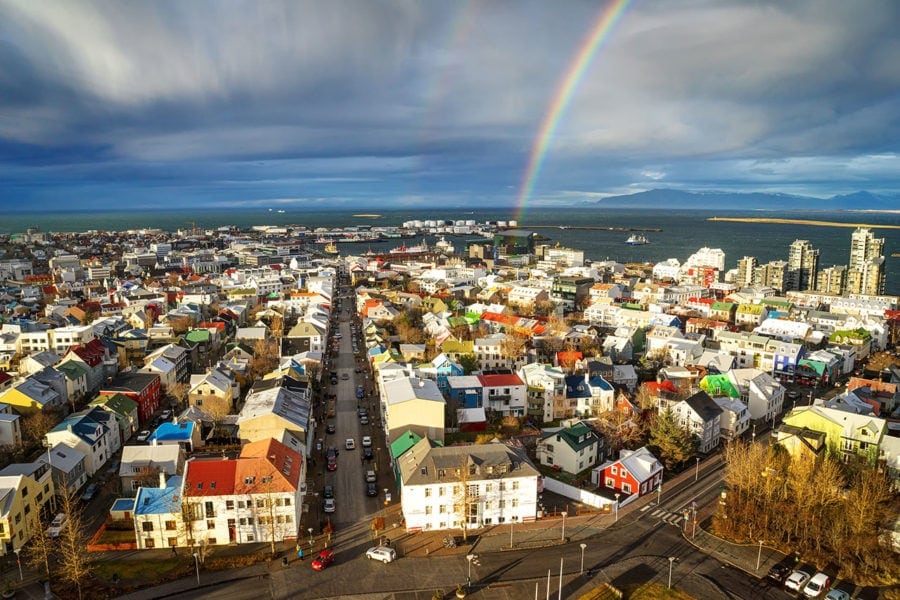
Reykjavik Iceland Hotel Guide
Reykjavik is the capital of Iceland, and where most travelers base themselves from initially. The city welcomes guests with a cosmopolitan mix of restaurants, cafes, street-art, museums and tour company headquarters.
The busy heart of Reykjavik is the Miðborg neighborhood, especially Laugavegur Street, where you’ll find shopping, restaurants, nightlife and all sorts of fun things to do.
If you want to be where all the action is, stay close to Laugavegur Street. But there are some other great neighborhoods in Reykjavik too, which I share below.
Here are my suggestions for the top hotels, hostels, and campgrounds in Reykjavik depending on your budget.
Also, if you prefer a local apartment, Airbnb is a great option for finding a cool place to stay in Iceland. Check out my Airbnb post for a $35 discount!
Loft Hostel – With two Best Hostel awards, Loft is one of the best places to stay in Reykjavik when you’re traveling on a budget. Located in the heart of the city, it features a large balcony to admire the city from above. They often organize music and activities, have good wifi, and friendly staff.
Rey Apartments – Rey Apartments is located in between the main shopping area and the trendy district of Skolavordustigur in Reykjavik. The modern, fresh looking apartments feature free wifi and fully equipped kitchens and living rooms. The geothermal Sunhollin swimming pool is just 10 minutes away!
Kvosin Downtown Hotel – When you want to be pampered, you can’t do much better than this Reykjavik hotel. Housed in a restored building from the 1900’s, this boutique hotel offers the largest rooms you can find in Reykjavik, decorated in modern Scandinavian style and featuring artworks by local artists.
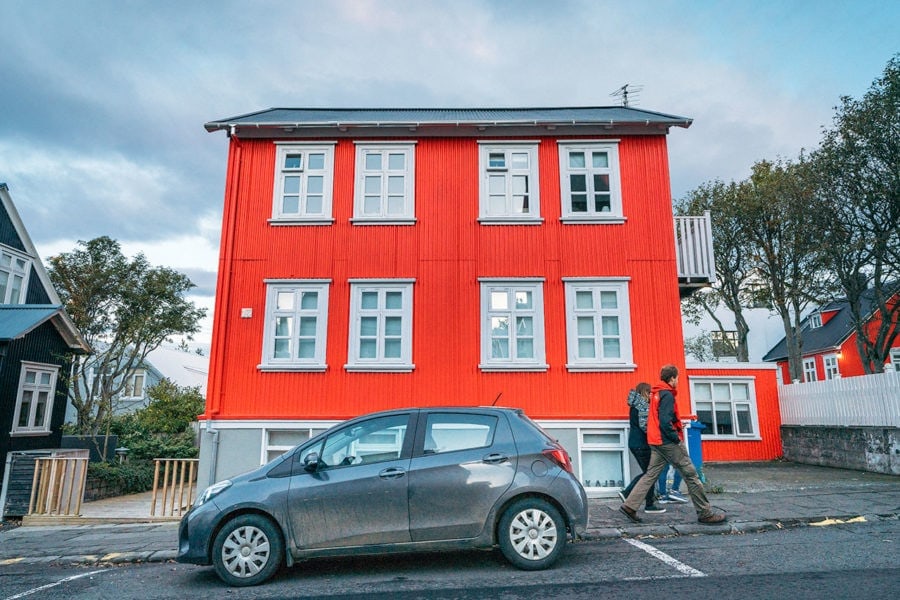
Cool Neighborhoods in Reykjavik
Midborg is where all the action is in Reykjavik, and where to stay for the best nightlife in the city. Full of quirky shops, museums, restaruants, and the main walking district.
Located just west of the city center, Vesturbær is a mix of residential neighborhood and little cafes. It’s a bit queiter than downtown.
A local working-class residential area east of the city, with plenty of parks & playgrounds. The name means “the hills” and places out here are much cheaper than the city center.
Laugardalur is kind of the sports and recreation hub of Reykjavik. Known as “the hot spring valley,” this is where you’ll find the local sports stadium as well as a campground.
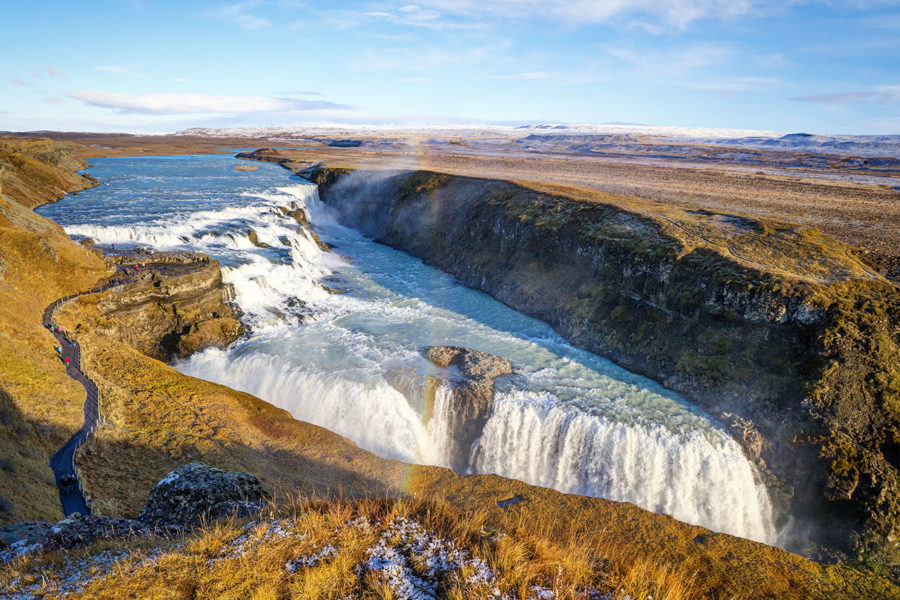
Golden Circle Hotel Guide
The Golden Circle is a circular 300km route that takes you from the capital city of Reykjavik towards the center of Iceland, and back again in a single day. It’s the perfect introduction to Iceland if you’re short on time or on a layover.
From ancient historical sites to beautiful natural landmarks, the Golden Circle has a bit of everything. You can join an organized tour of the Golden Circle or rent a car and self-drive at your own pace.
Most people base themselves from Reykjavik for this drive, however, you can also spend the night somewhere along the Golden Circle. The towns of Selfoss and Hveragerði are good options for this.
Here are my suggestions for the top hotels, hostels, and campgrounds on the Golden Circle depending on your budget.
Selfoss Hostel – Everything you need to get a good night’s of sleep before you continue to explore Iceland. The clean, functional rooms have free wifi and a view over Ingolfsfjall mountain. There’s free parking, which is a big plus when you’re renting a car in Iceland. There’s a big common kitchen and a hot tub too.
Eldhestar – Located only half an hour from the capital, this Iceland eco-hotel provides everything you need to relax. You can have a cup of hot tea in the lounge next to the fireplace or enjoy a cocktail at the bar. Each room has a private entrance with nature-inspired décor. Eldhestar has an outdoor wooden hot tub and is located next to an Icelandic horse farm.
Frost & Fire Hotel – This unique luxury hotel in Iceland is near a geothermal area, giving you the feeling of being in the middle of nature. Thingvellir National Park is only a 40-minute drive away. Relax at the spa-like facilities including two hot tubs, an outdoor pool, hot spring powered Jacuzzi and sauna. You can even cook an egg over a natural hot spring for breakfast!
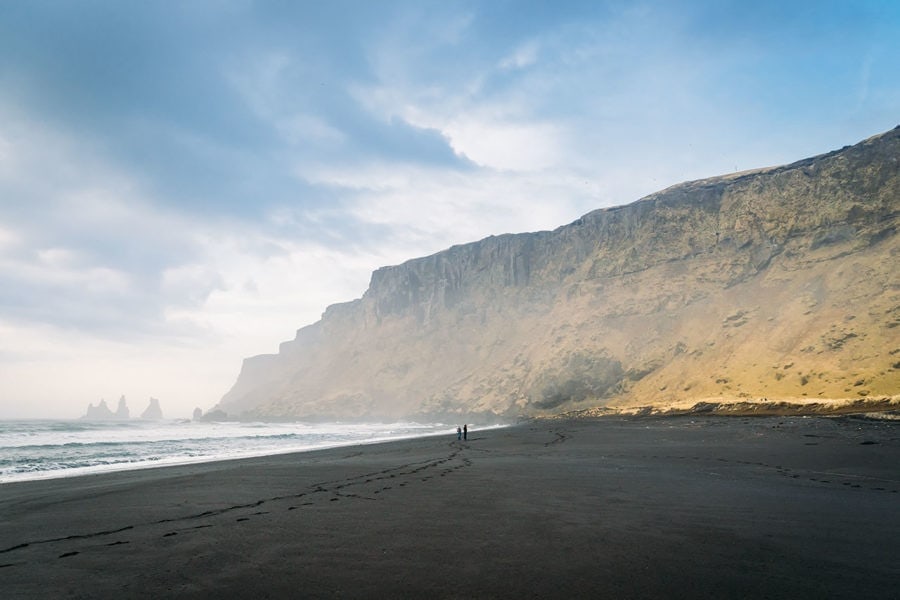
Where to Stay in Vik, South Iceland
Iceland’s South Coast is filled with natural wonders, making it perfect for an adventure outside the capital. If you’re driving around the entire Ring Road on Route 1, this is usually the next stop after a trip around the Golden Circle.
The South Coast is home to some of Iceland’s most famous waterfalls, like Seljalandfoss and Skogafoss. Reynisfjara Black Beach, Sólheimajökull Glacier, and the Eyjafjallajokull Volcano are other highlights.
One of the larger towns tourists stop at is called Vik [MAP], with many different lodging options, restaurants, and activities nearby. So it’s a great place to stay for a night or two.
Here are my suggestions for the top hotels, hostels, and campgrounds along Iceland’s South Coast depending on your budget.
Puffin Hostel – Located in the center of Vik, this hostel is only a 10-minute walk from the fabulous black beaches. It offers a fully equipped kitchen and a shared seating area. The functional rooms have shared facilities and bathrooms.
The Barn – Located near Vik and provides a great base for exploring the South Coast of Iceland. It features parking and free wifi, being great for travelers who tour the island by rental car. The rooms offer enough privacy, which makes this hostel a great option for couples. Some of the rooms have a view over the mountains and there are dormitory beds with drapes available.
Hotel Kria – For a luxurious stay near Vik this new hotel opened in 2018. The rooms have a modern design and all the facilities one can expect from a high-class hotel. During your stay at Kria you can enjoy amazing mountain views, a cocktail at their bar or a delicious meal at their restaurant, which serves Icelandic specialties. The breakfast buffet features food from local farms.
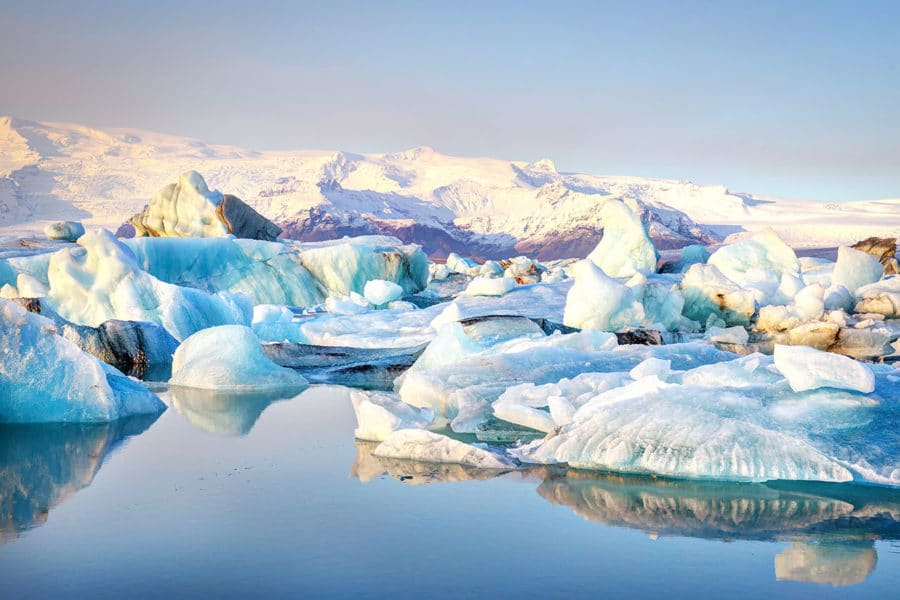
Best Iceland Hotels Near Hofn
Continuing your drive on Iceland’s Ring Road, you’ll eventually reach the fishing village of Höfn. Höfn means “harbor” because it sits on one of the few natural harbors found in Iceland. This is the next major town after Vik, about a 4-hour drive away.
While four hours doesn’t seem like much, there’s so much to do in between these two Icelandic towns on the South Coast that you can easily spend a full day on activities, and may want to spend a night here.
Hofn is the town closest to Jökulsárlón glacier lagoon and Vatnajokull National Park. Watching the sunrise from Jökulsárlón was one of the highlights of my trip, so you might want to sleep nearby.
Here are my suggestions for the top hotels, hostels, and campgrounds near Hofn and the glacier lagoon depending on your budget.
Lilja Guesthouse – This friendly guesthouse offers spacious rooms with a warm floor and private bathrooms. The quiet rooms are equipped with a coffee machine and free WiFi. The nearby mountains provide a great view for the guests, who can enjoy their coffee in the shared lounge.
Hotel Hofn – Most rooms have views of the nearby glaciers and the sea. The hotel has private parking, a great bonus if you are traveling by rental car. You can dine on the restaurant’s terrace to admire the view as you enjoy Icelandic specialties. Jokulsarlon glacier lagoon is one hour away, while the Silfurnes Golf Club and Hofn Harbour are only a 10-minute walk.
Aurora Cabins – If you’re lucky, you might catch the magnificent aurora borealis from the cabin porch at this awesome Iceland hotel. There’s a small hill nearby with a bench on top, another nice spot to admire the lights. The cabins are spacious and feature free wifi, a kitchen with microwave and toaster, terrace and a seating area. Great romantic place for couples!
East Iceland is often overlooked by tourists, being so far from the capital of Reykjavik. But it has a lot to offer. The picturesque fishing villages which line the rugged landscape are dotted with waterfalls and glaciers, making the area perfect for hiking.
The main city people base themselves in East Iceland is called Egilsstaðir, one of Iceland’s youngest towns. It was built on the banks of the Lagarfljot River in a wide valley. It has good access to the Eastern Fjords too.
East Iceland is also rich in legends about the elves and other mythical creatures which were believed to populate the area. It’s a good place for wildlife spotting, including herds of wild reindeer, arctic foxes, and puffins.
Here are my suggestions for the top hotels, hostels, and campgrounds near Egilsstaðir and the East Fjords depending on your budget.
Akureyri is the largest and most important town in Iceland, after its capital. It is an old trading city and important fishing hub, it’s also a wonderful base for whale watching trips. The city has heated swimming pools too.
Travelers to Iceland generally end up staying in the city of Akureyri, or near Lake Myvatn, depending on where you end up after a long drive on Route 1.
Lake Myvatn is located in an active volcano area and is surrounded by amazing lava formations. There is a rich population of water birds living around the lake, making it great for bird watching.
Here are my suggestions for the top hotels, hostels, and campgrounds around Akureyri depending on your budget.
Town Square Guesthouse – At Town Square Guesthouse you will find all the essentials for a decent stay. Some rooms offer views over the sea or the mountains, while all of them include access to a shared bathroom and free WiFi. Guests also have access to a fully equipped shared kitchen and a nice terrace.
Icelandair Hotel Akureyri – This Iceland hotel in Akureyri offers modern rooms with wooden floors and comfortable beds. They have a cozy bar with a fireplace, and the restaurant cooks delicious meals with Icelandic and Mediterranean influences. The Akureyri swimming pool and geothermal hot tubs are only a 2-minute walk away from the hotel.
Hotel Kjarnalundur – Just 2km away from Akureyri Airport and 5km from the city center. The panoramic views of the surroundings and the amazing Aurora Borealis can be enjoyed from all over the property. There is a hot tub on the deck of the cottage, which also provides a great spot to admire the scenic landscapes Cozy, modern design with wooden finishes. You also get free access to their sauna!
Snæfellsnes Peninsula is nicknamed “miniature Iceland”, thanks to its vast diversity of landscapes. This also makes it perfect for a quick weekend getaway, during which you can enjoy the best of Iceland.
Driving around this peninsula you’ll find waterfalls, hot-spring pools, lava tubes, black sand beaches, old churches, fields of wildflowers in the spring, and massive glaciers.
Driving around Snæfellsnes is another day-trip option if you don’t have a lot of time in Iceland, as it’s located only 2 hours north of Reykjavik city.
Here are my suggestions for the top hotels, hostels, and campgrounds on Snæfellsnes Peninsula depending on your budget.
North Star Guesthouse – North Star Guesthouse offers spacious rooms and free private parking on the main street of Olafsvik. There is a self check in/check out which makes everything easier for the traveler who wants to get some rest before heading to the restaurants in the area for a drink and a meal. Popular activities for guests are golfing, hiking and fishing.
Arnarstapi Hotel – Located only 200m from the Gatklettur rocks and offers views over the sea, which makes it ideal when you just want to relax and enjoy nature after a long day. The rooms are modern and feature private bathrooms. This new hotel also has an on-site restaurant where you can enjoy some of the most delicious Icelandic specialties.
Fell Holiday Home – This place has 6 separate bedrooms with 2 bathrooms, a fully equipped kitchen and a living room. The apartment also has a garden, which makes a great place to admire the Northern Lights and the Gatklettur rocks. There is free WiFi all over the modern property.
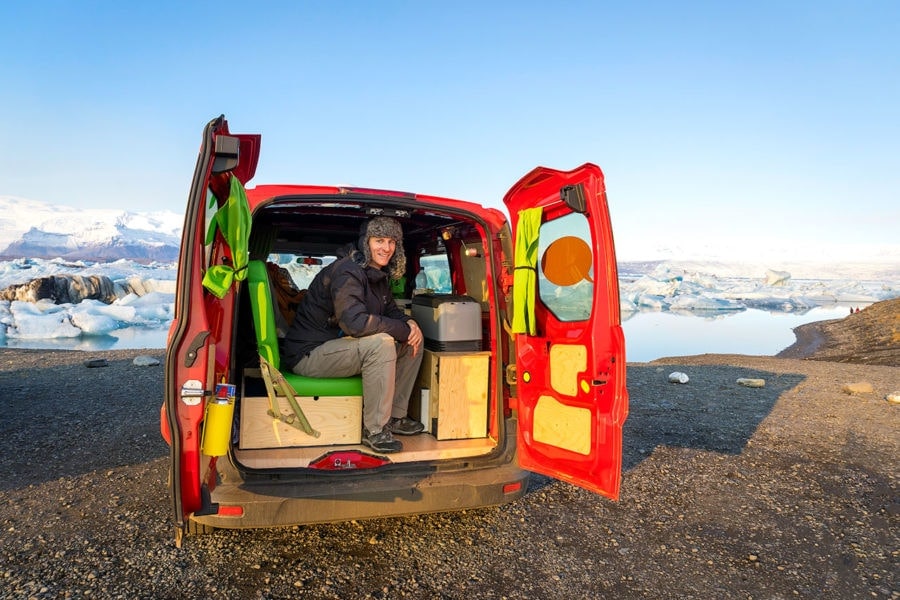
Stay in a Campervan!
There are many ways to explore Iceland. Most people rent a car while staying in hotels, or rent a campervan while sleeping in the vehicle. Convenience is one of the main reasons people choose to rent a campervan.
Once you’ve rented the vehicle, you can start driving and exploring the country on your own terms. It’s a lot easier to find a campground with space for your van than it is to book a last minute hotel in Iceland.
Renting a campervan in Iceland can save you a lot of time and money. You can prepare your own food on the go and save money on accommodation. It also gives you a lot of flexibility to change your plans anytime you want.
But life on the road might take its toll, especially if you have small kids. Not all campervans will have a toilet and you might definitely miss showering on a regular basis.
The weather depends on luck and what time of year you visit Iceland. A worst case scenario is that you might have to cook in the rain, snow, or deal with high winds and cold temperatures.
I’ve traveled around Iceland both ways, and if you’d like to rent a campervan in Iceland, I highly recommend Happy Campers.
Check out my travel gear guide to help you start packing for your trip. Pick up a travel backpack, camera gear, and other useful travel accessories.
Find cheap flights on Skyscanner. This is my favorite search engine to find deals on airlines. Also make sure to read how I find the cheapest flights.
RentalCars.com is a great site for comparing car prices to find the best deal. Also read my tips for driving in Iceland.
Booking.com is my favorite hotel search engine. Or rent apartments from locals on Airbnb. Read more about how I book cheap hotels online.
Don’t forget travel insurance! I’m a big fan of World Nomads for short-term trips. Protect yourself from possible injury & theft abroad. Read more about why you should always carry travel insurance.
Recommended Guidebook: Lonely Planet Iceland
Suggested Reading: The Little Book Of Hidden People
Complete Guide To Iceland’s Ring Road
Golden Circle Day Trip From Reykjavik
Epic Iceland Photography Locations
Have any questions about where to stay in Iceland? Which hotels in Reykjavik have you stayed at? Drop me a message in the comments below!
This is a post from The Expert Vagabond adventure blog.
The post How to Spend 48 Hours in Geneva appeared first on The Blonde Abroad.
The post 10 Tips for Your First Trip to South Africa appeared first on The Blonde Abroad.
The post The Ultimate Girlfriend Getaway Guide to Cape Town appeared first on The Blonde Abroad.

How To Choose The Best Travel Backpack
As a professional world-traveling backpacker, I get a lot of emails asking about the best backpacks for travel. There are so many to choose from! Here’s my advice, plus tips for how to find your own.
There’s something magical about traveling to new countries for the first time.
Getting lost in foreign cities, meeting cool people, breaking out of your comfort zone, discovering cultures different than your own, and having life-changing experiences.
Maybe you are planning your own backpacking adventure soon — South East Asia, Europe, or South America — and you need a good travel backpack to hold your stuff.
But what’s the best travel backpack to take on your next adventure?
There’s no easy answer to this question. Different types of travelers will have different requirements and budgets.
My goal with this backpack buyer’s guide is to help you narrow down the overwhelming choices that are out there — and pick the top travel backpack for traveling anywhere. Whether you’re traveling for 2 weeks or 2 months.
Here’s everything we’re going to cover (feel free to click to go to a specific section if you want to skip around). Make sure to read all the way to the end for a chance to win your own free travel backpack!
We’ll get to the juicy stuff in a second (I promise!), but first, it’s important to understand what makes a backpack good for travel.
Experience! I’ve been backpacking around the world for the past 9 years as a professional travel blogger & photographer, visiting over 50 countries while living out of my bag. This guide is also completely independent, with no sponsored content.
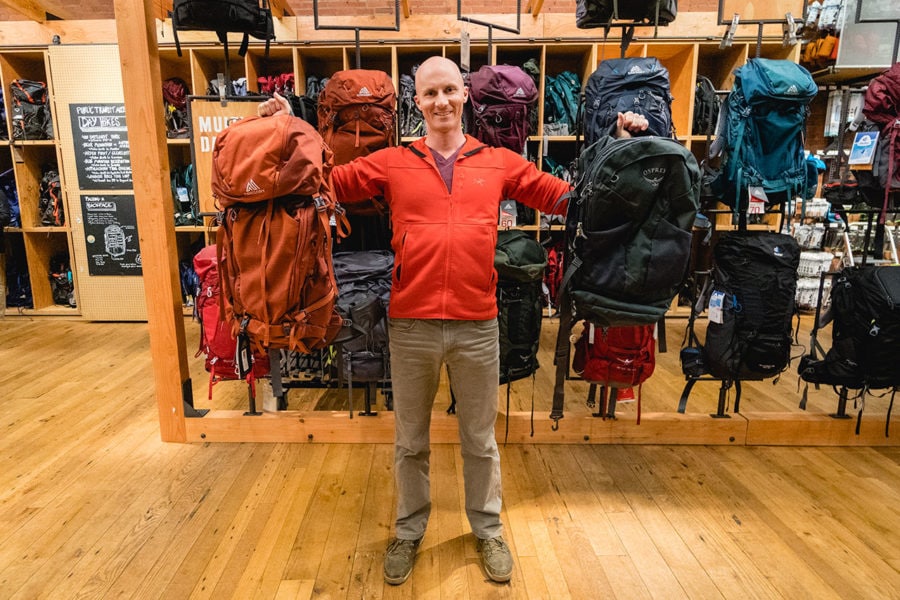
Tips For Choosing a Travel Backpack
WEIGHT – Obviously you want the lightest travel backpack you can find, that’s also comfortable, because this will save your back from fatigue. The materials a backpack is made of can also affect its weight, and super light-weight fabrics can increase the price.
SIZE & CAPACITY – Backpack sizes are usually quoted in liters of volume they can hold. Generally, 15-30 liters is considered a daypack, 40-50 liters is big enough for a weekend trip or carry-on only travel, and 55-75 liters is for those who need extra clothing or gear.
FRONT LOADING – Hiking backpacks are usually top-loading, meaning you need to dig through them from the top to find your stuff. Travel-friendly backpacks are front-loading, so they zip open more like a suitcase and it’s easy to locate gear quickly.
STRAP TYPES – A padded waist strap distributes the weight of your backpack on your core, instead of just your shoulders. This helps avoid sore shoulders and back pain, especially when wearing it for long periods of time. Some travel backpacks also have padded grab-handles or a duffle-bag strap which is a nice feature.
GEAR POCKETS – This is subjective, and everyone is different, but I prefer a minimal amount of pockets on my travel backpack. Some important ones include a quick-access pocket for things like keys, passport, sunglasses, etc. I also love when there’s a laptop pocket, and one for my filtered water bottle.
ZIPPERS – I prefer large, easy to use zippers on a backpack. Bonus points if they’re lockable zippers, specifically designed to be secured with a small luggage lock.
PROPER FIT – You could have the best travel backpack available, but if it doesn’t fit right, you’ll be miserable. Your torso length is more important than your height. Here’s a great backpack fitting guide.
LOOKS – Some travel backpacks are built wider than they are tall, making them look kind of “boxy” compared to hiking backpacks. It isn’t always flattering. But it’s ultimately up to you how important looks are.
WEATHER RESISTANCE – The material a backpack is made of can determine how weather-resistant it is. Some backpacks need a special rain-cover, others have rain-resistance built right in. You don’t want your gear getting wet!
CARRY-ON FRIENDLY – Airlines are starting to get much more strict about the size and weight of your carry-on bag. As a general rule, I wouldn’t try to bring anything larger than a 45L travel backpack for carry-on luggage to be safe.
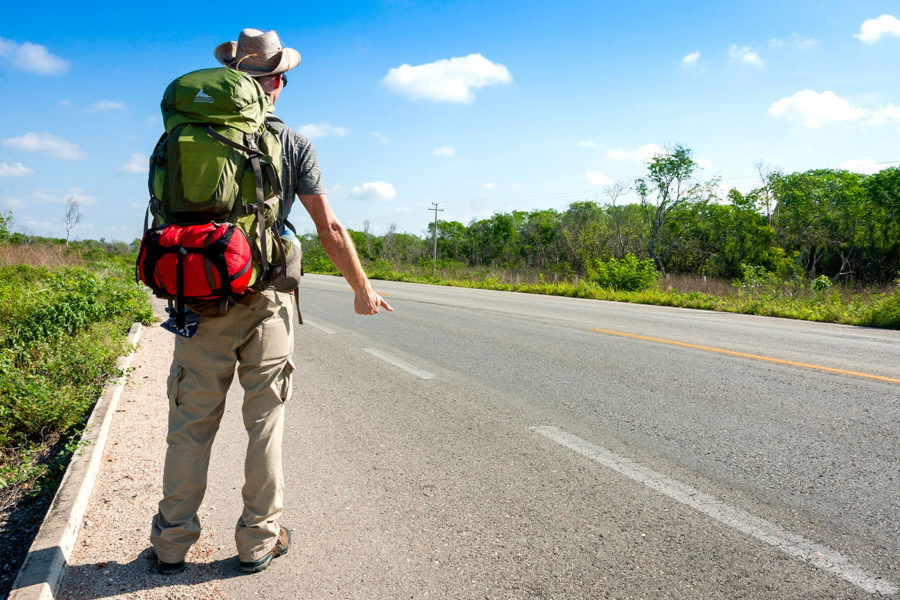
Different Types of Travel Backpacks
When choosing a travel backpack, it’s important to have a general idea about how you plan to use it. Generally, I split backpackers up into three different categories.
If you’re a light packer, you can actually fit quite a bit of stuff into a 40L carry-on backpack. However, if you lug around a lot of camera gear, camping equipment, or clothing — you’ll want a larger backpack to check under the plane.
Carry-on backpackers prefer to travel carry-on only and hate checking bags at airports. They primarily visit cities on the “backpacker trail” with decent travel infrastructure like hostels, hotels, transportation etc. They might embark on the occasional day hike, but don’t need their own camping gear.
Gap year backpackers are students taking a year off to travel before university, or maybe recent college graduates traveling through Southeast Asia or Europe before starting their professional careers. Many are first-time travelers — inexperienced with packing light. They often need to check a bag because they tend to overpack.
Adventure travelers spend a lot of time in the mountains, deserts, and jungles. Maybe they like to hitchhike, and prefer visiting more remote destinations where they may not have a roof to sleep under. They pack their own multi-day trekking and camping equipment to survive outside in the backcountry.
The travel backpack you choose from the guide below will depend on what kind of traveler you are (or think you’re going to be).
Probably the most popular carry-on travel backpack right now for GAP year travelers and hostel enthusiasts. The Osprey Farpoint 40‘s front-loading design is super easy to use and holds a lot of gear. But the big draw is how comfortable it is due to a really good suspension system and straps.
The straps can be stowed-away with a zipper, turning this backpack into a streamlined travel bag with a padded carry-handle. The comfortable hip-belt makes it work well for day-hikes, and it’s not as “boxy” looking as other digital nomad backpacks. You can take it on a hike and not look out of place.
The Nomadic Travel Bag was created after a very successful Kickstarter aimed at minimalist digital nomad types who work while they travel. It’s full of design features that cater to this special demographic.
From a dedicated underwear pocket to power cord management, this carry-on backpack has thought of everything a millennial business traveler could ever want. It converts into a duffle bag and has a dedicated laptop pocket. It also easily attaches to a rolling suitcase.
If you want a carry-on travel backpack with a more sporty style, look no further than the Kelty Redwing 44. This is also the lightest backpack of the bunch because it was designed as a hiking daypack and overnight travel bag.
However you can cram a lot of travel gear inside, the perfect size for people who only travel with one bag. There are plenty of compartments for organizing your stuff. The hybrid U-zipper design is both top-loading and front-loading, allowing easy access inside.
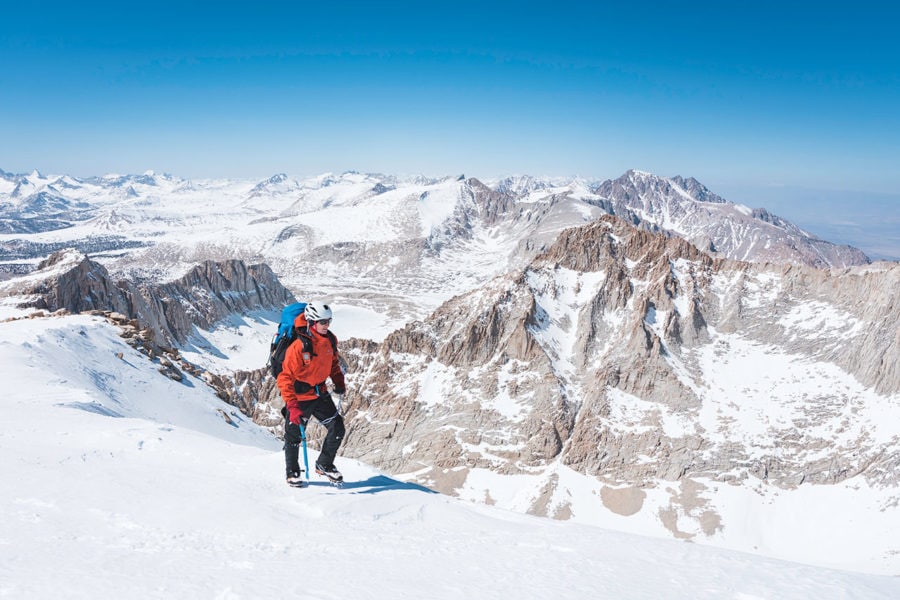
Climbing Mount Whitney with my Bora 50
Traveling carry-on only isn’t for everyone. Maybe you are not an expert traveler yet, and need more space for your clothing. Or you prefer more adventure travel, hiking, and camping than the average backpacker.
Then you may want to look at the best backpacks for both travel AND hiking.
These backpacks have enough space to accommodate a sleeping bag, tent, and cooking equipment needed for typical trekking and overnight camping adventures.
The Gregory Mountain Zulu is a cross between a travel backpack and a hiking pack. Its crossflow suspension system is wonderful at distributing your gear weight, with plenty of airflow to keep your back cool. Along with a traditional top-loading pull cord, the backpack also boasts a U-shaped front access zipper which is handy for travel.
Hidden inside the pack you’ll find a removable lightweight “summit bag” that can act as a daypack for shorter adventures, like going to the beach or walking around town. The hipbelt is well-padded with two easy access pockets. This is a backpack that can handle all kinds of different travel situations.
The Osprey Atmos 65 is the perfect travel backpack for people who prefer more traditional overnight trekking or camping trips. Its best feature is the super comfortable AntiGravity suspension system that helps distribute the load on your body.
Additional handy features include a large front stretch mesh pocket, integrated rain cover, and a very lightweight design compared to other hiking backpacks. If you’re going to be embarking on a lot of adventure travel with equipment like a sleeping bag, hammock, or tent, this is a great bag.
I’m a big fan of Arc’teryx outdoor gear. While it’s expensive, their attention to detail is unrivaled. The Arc’teryx Bora 50 is no exception. It’s a true adventure backpack for traveling in the backcountry. The coolest features are a composite frame and crazy comfortable hipbelt suspension system.
This backpack remains comfortable even with a lot of heavy gear. The pack itself isn’t very light, but the innovative floating hipbelt makes up for this in that it carries weight on your hips far better than others. Also, the fabric is so waterproof on its own that I usually don’t bring a rain cover with me.
The Osprey Fairview 40‘s is basically the women’s version of the Farpoint 40 travel backpack. Great for GAP year travelers and hostel enthusiasts. Its front-loading design is easy to use and holds a lot of gear, with a comfortable (and stow-away) suspension system.
The women’s version comes in a few different colors and a slightly different female-friendly fit.
The Gregory Mountain Deva is the female version of the Zulu. A cross between a travel backpack and a hiking pack. Its crossflow suspension system is great for distributing your gear, with plenty of airflow to keep your back cool. Plus that handy U-shaped front access zipper which is perfect for travel.
The women’s version comes in a few different colors and a slightly different female-friendly fit.
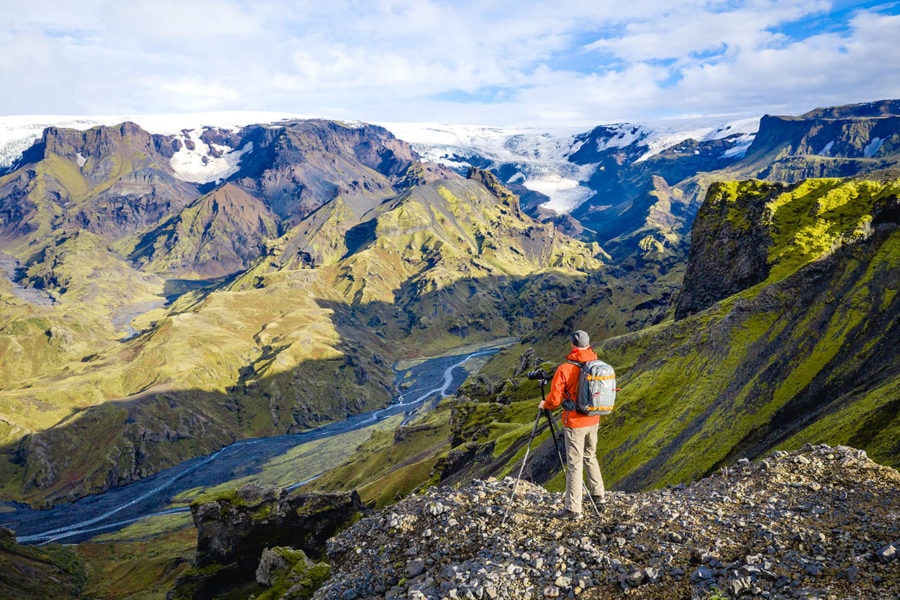
Great Camera Backpacks for Travel
So, what if you travel with a ton of camera equipment like me? Multiple cameras, lenses, a drone, etc.
To pack all that expensive gear in a safe and secure way, I prefer traveling with a dedicated carry-on friendly camera backpack, and check a separate bag with all my clothing and adventure gear.
The LowePro Whistler 350 has been my favorite travel camera backpack for years now! The special TPU coating can take a lot of abuse from the elements, and a large easy-to-use zipper allows you to open the camera compartment quickly, even with gloves on. The newer versions have a laptop pocket too.
It holds a deceptively large amount of gear, and I regularly carry it on airplanes loaded down with 30-40 lbs (don’t tell the airlines!). There’s a large front pocket to pack your lunch, a jacket, or even avalanche equipment. External gear straps can hold snowshoes, a snowboard, skis, your tripod, or anything you need.
The Peak Design Everyday Backpack is a popular walk-around camera bag that’s great for lugging your camera equipment around cities, for day hikes, or as a carry-on camera backpack. The material looks great but is pretty weather resistant too.
It has three points of entry into the bag. From the top, as well as two side flaps for easy access to your camera gear without needing to remove the backpack completely. The MagLatch system leaves part of the bag open on the sides, because there’s no drawstring closure.
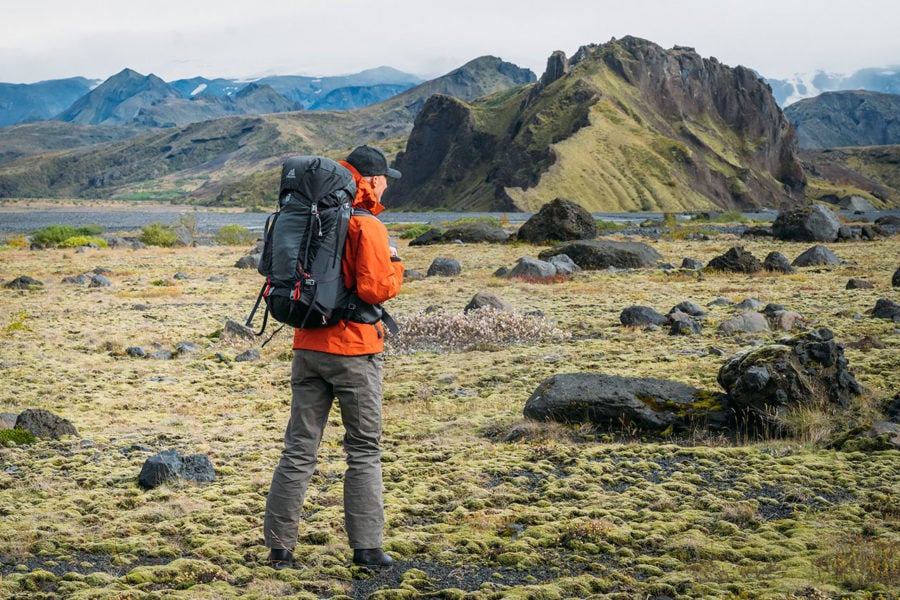
Exploring Iceland with my Gregory Zulu 55
Traveling with a backpack allows you to get around hands-free using Google maps or buying train tickets, not to mention climbing stairs or tackling dirt roads is so much easier than with your typical rolling suitcase.
But it really depends on your travel style.
While I initially began my nomadic career with a backpack, as I’ve grown older, I now prefer a rolling duffel bag for most trips. It’s especially handy for traveling in cities and less tiring when walking on concrete.
I own a few travel backpacks but only use them for specific situations, like weekend-trips, or overnight trekking.
Now that I have a base in Italy, I store these other bags away. But if you’re a vagabond living out of your backpack full time, you don’t have that luxury.
North Face Rolling Thunder – My current favorite travel bag with plenty of room, heavy-duty lockable zippers and a waterproof shell. A seperate compartment for hiking boots, and big wheels for dirt roads & cobblestones.
Gregory Zulu 55 Backpack – This lightweight, super comfortable overnight trekking & travel backpack includes full front-zipper access to all my gear. It can lie flat in my roller bag if I don’t need to check both.
Lowepro Whistler 350 – My amazing carry-on camera & laptop backpack. I use this for day hikes with my camera gear, but it has room for things like snacks, water, jacket, full-size tripod, snowboard, ice-axe, etc.
Arc’Teryx Granville 18 Tote – This is what I use as my airline approved “personal item”. It’s basically an overdesigned water resistant masculine tote bag that zips shut.
READ MORE: My Complete Travel Gear Guide
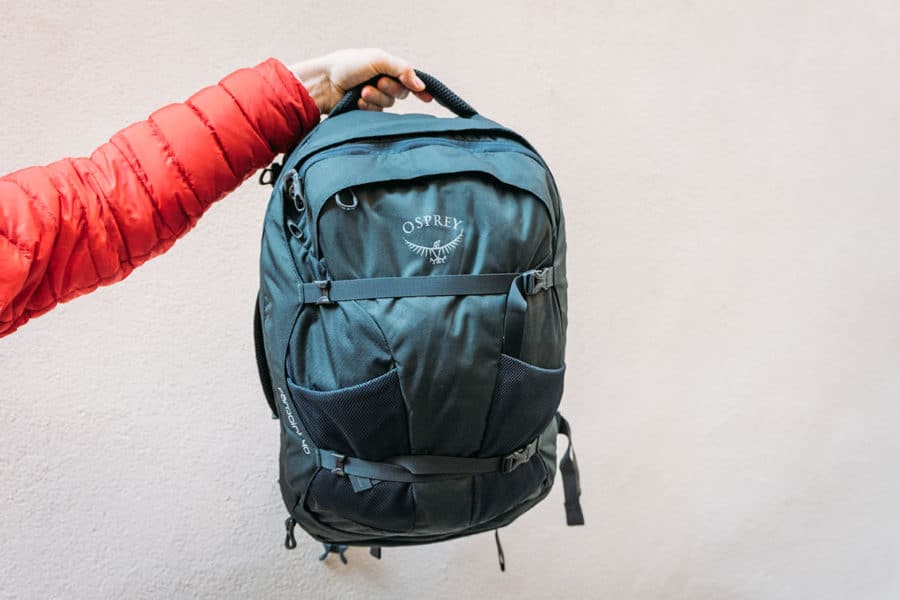
Win This Osprey Farpoint 40!
Congratulations! That was a long post, and to reward you for making it down this far, I’m giving one lucky reader a free travel backpack for their next trip.
Travel in style with one of the most popular backpacks for exploring the world these days, a carry-on friendly Osprey Farpoint 40L. This isn’t sponsored at all, I’ll purchase it for the winner myself.
ELIGIBILITY: Ages 18+
The promotion is only open and offered to residents of the United States & Canada, due to strict laws regarding giveaways in different countries. I wish I could offer it to others, but legally speaking, it’s almost impossible to organize.
CHOOSING A WINNER:
A winner will be selected at random from the list of entries and notified by email or social media on March 10th. If the winner does not respond within one week, an alternate winner will be chosen at random.
PRIZE:
The winner will receive a new Osprey Farpoint (or Fairview) 40L Backpack. The prize is shipped to the winner’s chosen address in the US or Canada. Customs fees are not included with the prize.
Enter your name and email address below and follow the instructions.
You’ll have the option to earn extra contest entries (and more chances to win!) by completing certain tasks, like leaving a comment.
Iceland’s Great Photography Road Trip
10 Simple Steps To Starting A Blog
Travel Quotes To Inspire You
My Favorite Gifts For Travelers
Have any questions about good travel backpacks? What about other suggestions? Drop me a message in the comments below!
This is a post from The Expert Vagabond adventure blog.